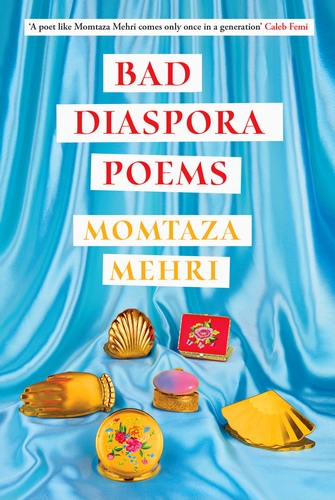Bad Diaspora Poems (FELIX DENNIS PRIZE FOR BEST FIRST COLLECTION, FORWARD PRIZE 2023, SHORTLISTED)
Momtaza Mehri
(Jonathan Cape 2023); hbk £14.99
To prefix the title of your debut Forward Prize nominated poetry collection ‘Bad’ may seem, at first, to be a brave choice. But Bad Diaspora Poems is clearly a title that encourages you to think about nuance – something which feels all the more important in a week in which Suella Braverman is having her ‘rivers of blood’ moment at the Tory party conference. ‘Diaspora’ – online definition ‘the dispersion or spread of a people from their original homeland’ – is a loaded term, so it is no wonder Momtaza Mehri wants us to think about the value judgements we might attach to it, just as she questions the ability of poetry to respond to such a topic. What does it mean to write ‘diaspora poetry’? What does it mean to write anything when your personal biography means some readers may look to you to represent a diaspora, speaking for countless people, living and dead, in countries and continents across the world?
Mehri is an inspiring figure. Still only 29, she began writing poetry for publication in 2014. Her work has appeared in an impressive (and suitably diverse) list of publications since. She was named the Young People’s Laureate of London in 2018. She is Somali-British. The blurb for this long-awaited first collection describes “the poet, the immigrant, the exile, the refugee, the runaway, the working-class artist, the translator, and the diaspora kid attempting to transcend their cliched angst” – a lot of identities to be juggling. It is testament to her skill that her poetry feels so effortless. I have read through the collection from start to finish three times now, and while the content is anything but light, there is a deftness of touch that keeps me going back for more.
The collection gives the impression of a historical record at first: sections with dates as titles exploring colonial incursions, assassinations and poets and artists who died in ‘foreign’ lands. Titles like ‘A Few Facts We Hesitantly Know to Be Somewhat True’, ‘You Will Deny It All’ and ‘Conditionals’ reveal the difficulties we have in untangling any ‘truth.’
If we love the same things, that makes us friends.
If we hate the same things, that makes us friends[…]
If we eat breakfast before ten, that makes us friends.
If we agree on the same lies, that makes us countrymen.
Later sections zoom in on a more personal history, exploring family experiences in the years leading up to the poet’s birth and then the poet’s own experiences. The poignantly titled ‘Sufficiently Memorable Password Recovery Questions for the Refugee Parent’ is both comic and tragic, conveying so much human experience in a simple list of prompts:
1. Think of a street from your childhood. If it still exists, name it.
2. What was the first nickname you lost?[…]
4. Here is a welcome mat. You only get one word. What will it be?
[…]
7. Name the city where you first followed a man into a graveyard. Willingly.
8. Did you want to be a muse or was that something else your children decided for you?
There is such a wide range of forms on show: prose poems, found poems, poems using emojis or made up of erasures, but this kaleidoscopic variety never feels gimicky. The sound of the words and the feeling provoked is always to the forefront. In the final ‘Bad Diaspora Poem’:
Exotic fruits bop in buckets. Sweet mangoes, pomegranates, figs.
Ripe signifiers weighing down the basket of poems such as these.
When a debut collection is trumpeted with publicity declaring a ‘once in a generation’ poet, I can be wary. But Momtaza Mehri deserves all the plaudits and any of the prizes that I suspect will come her way. At the risk of gross understatement, her Bad Diaspora Poems are anything but.
Stephen Carruthers


Leave a Reply